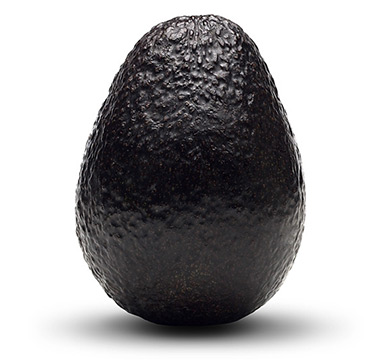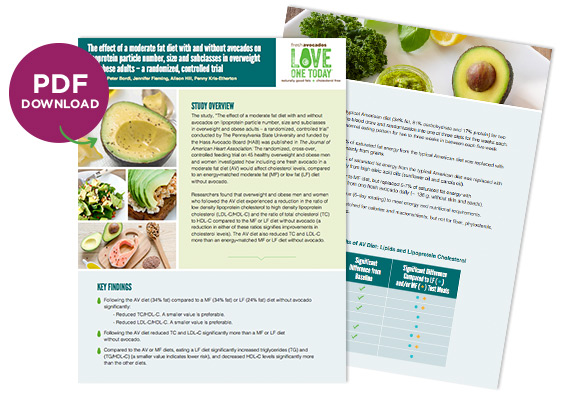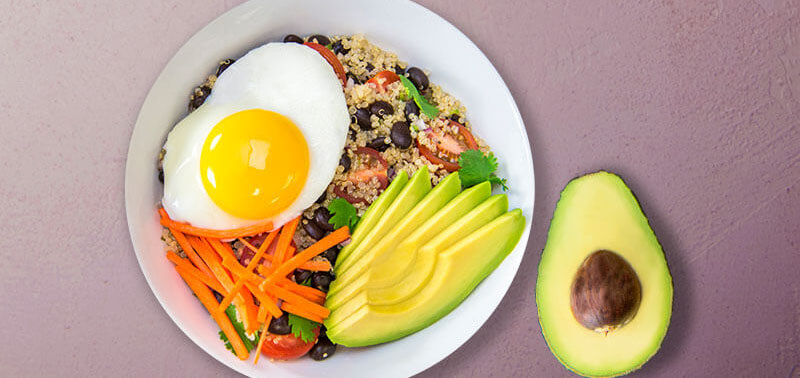Study Overview
The study was conducted by The Pennsylvania State University and funded by the Hass Avocado Board (HAB) was published in The Journal of American Heart Association.1 The randomized, cross-over, controlled feeding trial on 45 healthy overweight and obese men and women investigated how including one fresh avocado in a moderate fat diet (AV) would affect cholesterol levels, compared to an energy-matched moderate fat (MF) or low fat (LF) diet without avocado. Researchers found that overweight and obese men and women who followed the AV diet experienced a reduction in the ratio of low density lipoprotein cholesterol to high density lipoprotein cholesterol (LDL C/HDL-C) and the ratio of total cholesterol (TC) to HDL-C compared to the MF or LF diet without avocado (a reduction in either of these ratios signifies improvements in cholesterol levels). The AV diet also reduced TC and LDL-C more than an energy-matched MF or LF diet without avocado.
Published: The Journal of American Heart Association
Study funded by Hass Avocado Board
Category: Cardiovascular Health
Download the Scientific Summary PDF
Read the Press Release
See Published Study
Key Takeaways and Findings:
Following the AV diet (34% fat) compared to a MF (34% fat) or LF (24% fat) diet without avocado significantly reduced TC/HDL-C. A smaller value is preferable.
Following the AV diet (34% fat) compared to a MF (34% fat) or LF (24% fat) diet without avocado significantly reduced LDL-C/HDL-C. A smaller value is preferable.
Following the AV diet reduced TC and LDL-C significantly more than a MF or LF diet without avocado.
Compared to the AV or MF diets, eating a LF diet significantly increased triglycerides (TG) and (TG/HDL-C) (a smaller value indicates lower risk), and decreased HDL-C levels significantly more than the other diets.

METHOD:
Participants consumed a typical American diet (34% fat, 51% carbohydrate and 17% protein) for two weeks prior to their baseline blood draw and randomization into one of three diets for five weeks each. Participants followed their normal eating pattern for two to three weeks in between each five week dietary intervention.
- LF diet composition: 6-7% of saturated fat energy from the typical American diet was replaced with complex carbohydrates mainly from grains.
- MF diet composition: 6-7% of saturated fat energy from the typical American diet was replaced with monounsaturated fat mainly from high oleic acid oils (sunflower oil and canola oil).
- AV diet composition: similar to MF diet, but replaced 6-7% of saturated fat energy with monounsaturated fat mainly from one fresh avocado daily (~ 136 g, without skin and seeds).
- Subjects were provided menus (6-day rotating) to meet energy and nutritional requirements.
- The MF and AV diets were matched for calories and macronutrients, but not for fiber, phytosterols, carotenoids or other bioactives.
CONCLUSION:
Based on these findings, researchers concluded that the inclusion of a food source rich in monounsaturated fats and dietary bioactives, such as fiber and phytosterols found in avocados, confers greater cardiovascular health benefits compared to a MF diet matched in monounsaturated fat content. It is worth noting that the diet that included avocado provided 35 percent more fiber than the diets without avocado. Additionally, the test diet included a whole avocado each day; more research is needed to determine whether the results could be replicated with consumption of a single serving, 1/5 of a Hass avocado. While the conclusions drawn are from a single study that cannot be generalized to all populations, the study does provide further insights on the effects of avocados on CVD biomarkers, such as LDL-C, in healthy overweight and obese adults.

Hass Avocado Board Supports Nutrition Research
The Hass Avocado Board (HAB) is a promotion, research and information organization under supervision of the United States Department of Agriculture. HAB has a science research pipeline of ongoing clinical studies investigating the relationship between fresh avocado consumption and weight management and risk factors for cardiovascular disease and diabetes. And, based on their nutrition and phytochemical components, emerging research suggests that avocados may play benefit many emerging areas, including skin, eye, joint and cellular health.
Reference:
1. Peou S, Milliard-Hasting B, Shah SA. Impact of avocado-enriched diets on plasma lipoproteins: A meta-analysis. J Clin Lipidol. 2016 Jan-Feb;10(1):161-71.





